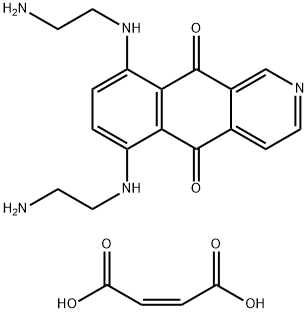144675-97-8
 144675-97-8 結(jié)構(gòu)式
144675-97-8 結(jié)構(gòu)式
基本信息
馬來酸匹衫瓊
匹克生瓊來酸鹽
馬來酸匹克生瓊
馬來酸鹽匹杉瓊
匹杉瓊馬來酸鹽
匹杉群馬來酸鹽
匹克生瓊馬來酸鹽
匹杉群二馬來酸鹽
馬來到匹杉瓊(PX)
Bbr 2778
Dimalate salt
Pixantrone maleate
BBR 2778 dimaleate
Pixatrone dimaleate
Pixantrone-dimaleate, BBR2778 dimaleate
6,9-Bis((2-aminoethyl)amino)benzo[g]isoquinoline-5,10-dione maleate
6,9-Bis[(2-aminoethyl)amino]benz[g]isoquinoline-5,10-dione (2Z)-2-butenedioate (1:2)
Benz(g)isoquinoline-5,10-dione, 6,9-bis((2-aminoethyl)amino)-, (2Z)-2- butenedioate (1:2)
物理化學(xué)性質(zhì)
H2O:5.0(Max Conc. mg/mL);9.0(Max Conc. mM)
| 報(bào)價(jià)日期 | 產(chǎn)品編號(hào) | 產(chǎn)品名稱 | CAS號(hào) | 包裝 | 價(jià)格 |
| 2025/05/22 | 46552 | Pixantrone dimaleate Pixantrone dimaleate, Thermo Scientific Chemicals | 144675-97-8 | 250mg | 3451元 |
| 2025/05/22 | S5059 | 馬來到匹杉瓊 Pixantrone Maleate | 144675-97-8 | 10mg | 1040.83元 |
| 2025/05/22 | S5059 | 馬來到匹杉瓊 Pixantrone Maleate | 144675-97-8 | 10mM (1mL in DMSO) | 1122.03元 |
常見問題列表
| Target | Value |
|
Topo II
() |
Pixantrone dimaleate is a topoisomerase II inhibitor. Pixantrone induces cell death in multiple cancer cell lines independent of cell cycle perturbation, with IC 50 s of 37.3 nM, 126 nM and 136 nM for T47D, MCF-10A and OVCAR5 cells, respectively. Pixantrone induces DNA damage at high concentrations (500 nM) but not at concentrations (100 nM) sufficient to kill PANC1 cells. Pixantrone (25 or 100 nM) induces severe chromosomal aberrations and mitotic catastrophe in PANC1 cells. Pixantrone (100 nM) may disrupt chromosome segregation because of generating merotelic kinetochore attachments that cause chromosome non-disjunction. Pixantrone potently inhibits growth of human Leukemia K562 cells, etoposide-resistant K/VP.5 cells, MDCK and ABCB1-transfected MDCK/MDR cells, with IC 50 s of 0.10 μM, 0.56 μM, 0.058 μM and 4.5 μM, respectively. Pixantrone (0.01-0.2 μM) leads to a concentration-dependent formation of linear DNA through acting on topoisomerase IIα. Pixantrone produces semiquinone free radicals in an enzymatic reducing system, although not in a cellular system, most likely due to low cellular uptake. Pixantrone (0.01-10 μM) shows potent inhibitory activities against rat 97-116 peptide-specific T cell proliferation.
Pixantrone (27 mg/kg) does not worsen pre-existing moderate degenerative cardiomyopathy in doxorubicin-pretreated mice, by i.v. one dose every 7 days repeated thrice (q7d × 3). Pixantrone (27 mg/kg) causes minimal cardiotoxic in mice following repeated treatment cycles. Moreover, Pixantrone results in less mortality than mitoxantrone in doxorubicin-pretreated mice. Pixantrone (16.25 mg/kg i.v, q7d × 3) modulates Lymph node cells (LNC) responses, and affacts T cell subpopulations in TAChR-immunized Lewis rats. Pixantrone also shows preventive and therapeutic effect in experimental autoimmune myasthenia gravis (EAMG) rats.

